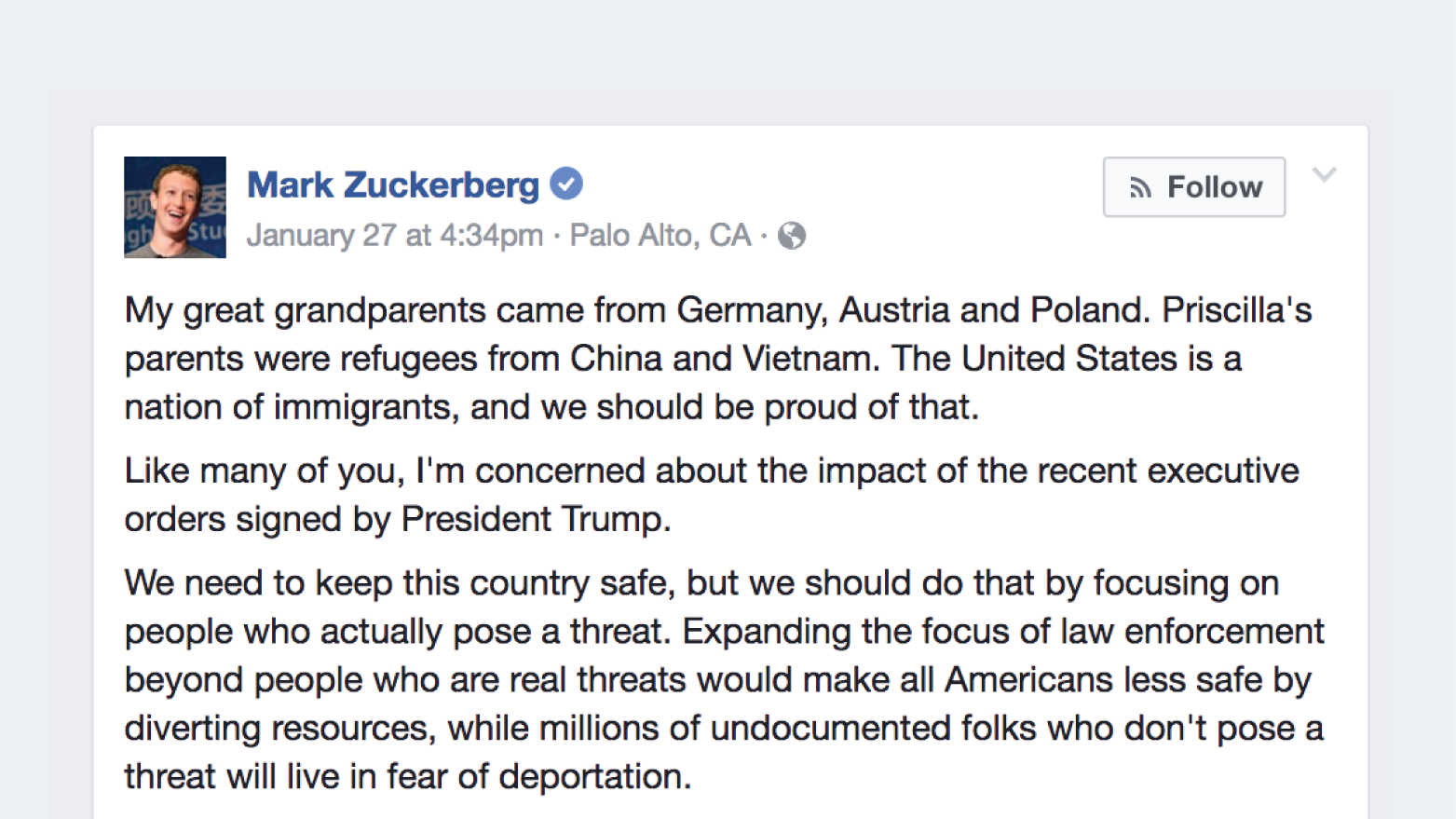7 Brands That Took A Stand Against The Refugee Ban, And How
Typically, we watch commercial brands bend over backwards to not get political. But not this weekend. Seven well-known brands released statements directly engaging the recent executive order to ban refugees from the Middle East from entering the United States. Each brand approached this communication differently, some of them even making major business decisions to show their dedication to the cause.
This proves that how brands respond to politics, particularly in today's climate, matters to consumers – so much so that they'll realign their loyalties based on it. So whether your organization is large or small, profit or non-profit, you may want to consider how your communications strategy engages the issues your community's concerned about, and what message you're sending when you send none at all.
Facebook
Founder and CEO of Facebook, Mark Zuckerburg took to what else but Facebook to release his statement against the ban.
“The United States is a nation of immigrants, and we should be proud of that,” he wrote, adding his grandparents came from Germany, Austria and Poland and his wife Priscilla's parents were refugees from China and Vietnam. “These issues are personal for me even beyond my family. A few years ago, I taught a class at a local middle school where some of my best students were undocumented.
He added: “They are our future too. We are a nation of immigrants, and we all benefit when the best and brightest from around the world can live, work and contribute here." (Source)
Lyft
Lyft may have been the most-heard brand in terms of its strong, generous response in opposing the ban. At around the same time that it's competitor Uber was defending its position on a DJT business council and breaking a taxi strike protesting the ban at JFK airport, Lyft released a statement on their blog that it would donate $1 million to the ACLU (American Civil Liberties Union), which has been in high gear working to fight the ban.
The news spread like wildfire, and people upset with Uber's less-than reaction, tweeting #DeleteUber suddenly had a really easy replacement. (Source)
Google
Chief executive of Google, Sundar Pichai, reached out to his employees to advise and support them in reaction to the ban and also took to Twitter to respond, highlighting the story of one affected Google employee, Sanaz.
Google's official statement said, "We're concerned about the impact of this order and any proposals that could impose restrictions on Googlers and their families, or that could create barriers to bringing great talent to the US." (Source)
Airbnb
Airbnb tweeted too. Brian Chesky, co-founder and CEO of Airbnb, made statements on Twitter and Facebook denouncing the order not to allow refugees into the United States, saying it was "not right, and we must stand with those who are affected."
He pledged to provide free housing to refugees and anyone not allowed in the U.S. who needs it. An Airbnb spokesperson added later that they plan on leveraging their existing disaster response tools to get this done. (Source)
Starbucks
Starbucks released a long statement from their online newsroom addressing not only the refugee ban but also the status of "Dreamers," the wall along Mexico and the Affordable Care Act.
"We are living in an unprecedented time," CEO Howard Schultz wrote, "one in which we are witness to the conscience of our country, and the promise of the American Dream, being called into question."
In response to the refugee ban, he announced plans to hire 10,000 refugees over 5 years in the 75 countries they do business. (Source)
Netflix
Netflix CEO Reed Hastings took to Facebook to share his position. Hastings used some of the strongest language to stand against the ban, calling it "so un-American it pains us all."
His more emotive language stands out beside the more official tones held by his tech industry peers. (Source)
Apple
CEO of Apple, Tim Cook, sent an email to his employees responding to the ban and establishing Apple's stance.
He was clear that Apple did not support the ban and expressed that "Apple would not exist without immigration, let alone thrive and innovate the way we do."
He invoked the words of Martin Luther King at the end, "We may have all come on different ships, but we are in the same boat now." (Source)








